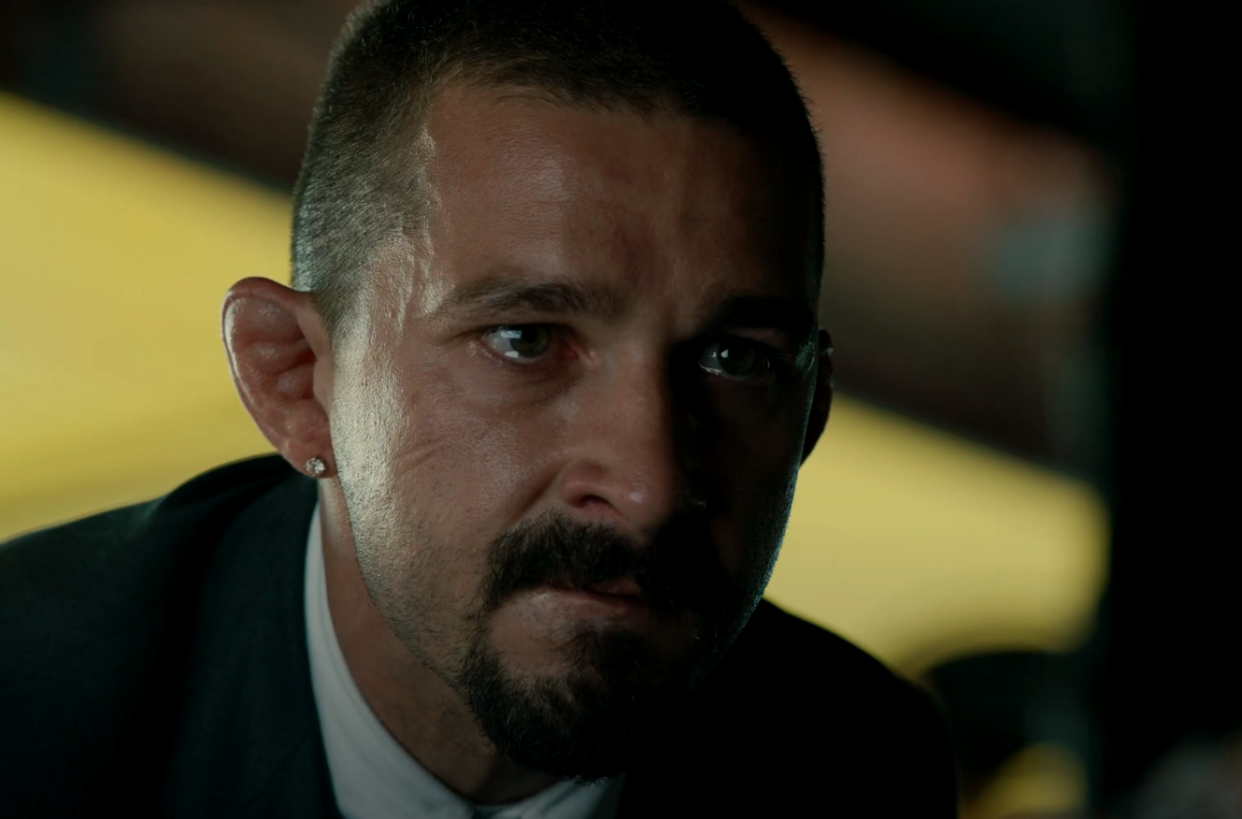‘The Tax Collector’ Review: Shia LaBeouf’s Racist Caricature Isn’t the Only Problem Here

Shia LaBeouf can give complex, transportive performances, with rough and edgy bursts of messy antics slathered on top of soul. Sadly, “The Tax Collector” is not “American Honey.” In writer-director David Ayer’s bland L.A. crime saga about a pair of drug lord minions caught in the crosshairs of a larger war, LaBeouf stares and struts his way through a cartoonish and culturally insensitive performance as a troublemaking thug named Creeper that most certainly did not require him to get his character’s name tattooed across his chest.
If the two-bit Latino burlesque (more whiteboy with Latino aspirations, but whatever) was the only problem with “The Tax Collector,” it would have to work overtime to make up for it. Yet even when “The Tax Collector” finds a steadier purpose as a taut revenge thriller, it’s mostly just a slog of vulgar threats and violent outbursts, trading substance for anger until the credits bring some measure of peace.
More from IndieWire
'The Secret Garden' Review: A Magical Revamp That Occasionally Delights
New Movies: Release Calendar for July 31, Plus Where to Watch the Latest Films
At least it finds some real stakes with David (Bobby Soto), the centerpiece of the movie and at times a formidable source of conflict. The titular tax collectors for a mysterious L.A. drug lord named Wizard (Jimmy Smith), David and Creeper speed around L.A. collecting fees from 43 local gangs and dealers, roughing up anyone behind on their payments. These boys radiate with the simmering fury of “Pulp Fiction” hitmen Jules and Vincent but lead far less exciting lives, so when rival Mexican drug lord Conejo (Chicago rap artist Jose Conejo Martin) shows up in town with machine guns and refuses to meet their demands, it’s a welcome complication.
David has a solid routine going, with a palatial home he shares with his wife Alexis (Cinthya Carmona) and their young children, a supportive uncle (George Lopez, fleeting and humorless) and an endearing extended family. At the same time, he wrestles with the shadow of his drug lord father’s legacy hanging over his head, and how it might get in the way of his safer priorities. The character has shades of Michael Corleone — a driven young man informed by tradition yet settled into a lifestyle destined to burn around him. There’s potential here, if one ignores the various times throughout the first act that LaBeouf pokes his head in the frame and juts around.
But “The Tax Collector” struggles to solidify into a meaningful scenario once Conejo shows up, with the actor scowling and glaring so hard his face threatens to collapse. Trapped between an offensive sidekick and a two-bit villain, Soto can only do so much to give his conflicted anti-hero some genuine emotion, but he works pretty hard in the only substantive performance on display.
It just takes some time to see it. The LaBeouf problem in “The Tax Collector” begs for further investigation because it comes so close to overtaking the drama in its first stretch. In tweets that made the news, Ayer claimed that Creeper is supposed to be a Jew who has absorbed the mannerisms of the world that surrounds him, but that detail doesn’t exactly become center stage; the result is an undeniable racist stereotype. Such posturing may happen on the vague backdrop of “the streets” that Ayer says the movie draws on, but it never amounts to more than a baffling Chicano caricature who may as well be dropping “ese” after every other word. Instead, he’s just saddled with bland tough guy dialogue (“We killin’ anybody today? I got fuckin’ nice shoes on!”) and fills in the rest with bird-like gestures. It’s a baffling one-note turn.
The setting does him no favors. “The Tax Collector” treats the concept of “the streets” as a discrete category of cinematic storytelling, reveling in Salvatore Totino’s snazzy cinematography as it tracks the characters speeding across the city to a blaring soundtrack, with plenty of “shit just got real, homie” back-and-forths. Ayer had a steadier handle on this milieu with his compelling police drama “End of Watch” and his “Training Day” screenplay — but the movies he’s made since then, from “Fury” to “Suicide Squad,” struggle to strike a tone between genuine danger and playful high style, largely because they struggle from a self-serious tone that leaves little room for nuance.
Nevertheless, “The Tax Collector” eventually arrives at a twist that pitches into a few thrilling passages, as it erupts into a man-on-the-lam B-movie with high stakes and promise of serious payoff. Yet even as these developments arrive with a modicum of suspense (and some memorably bloody images), it all collapses in a mindless hail of bullets and blood, laced together with a script that feels like it was written for video game cutscenes (“I came as a friend and offered you life! Now I come as an enemy and offer you death!”), not to mention a bizarre ritualistic slaughter that could have been an outtake from “Apocalypto.”
With so much mismatched content and only 90-odd minutes to pull it off, “The Tax Collector” stuffs in the most exciting showdown into its closing minutes as an afterthought. It’s a bizarre turn of events that suggests since we knew where this was heading all along, there’s no reason to waste our time. Maybe that’s true. But the finale of “The Tax Collector” actually finds David wrestling with questions of his own criminal legacy in a way that could have been far more exciting earlier on. After all, David’s a family man who never asked to play a central role in this story. By the end of “The Tax Collector,” it’s hard to blame him.
Grade: D+
“The Tax Collector” is in theaters, on demand, and digital from RLJE Films on August 7, 2020.
Best of IndieWire
Sign up for Indiewire's Newsletter. For the latest news, follow us on Facebook, Twitter, and Instagram.

